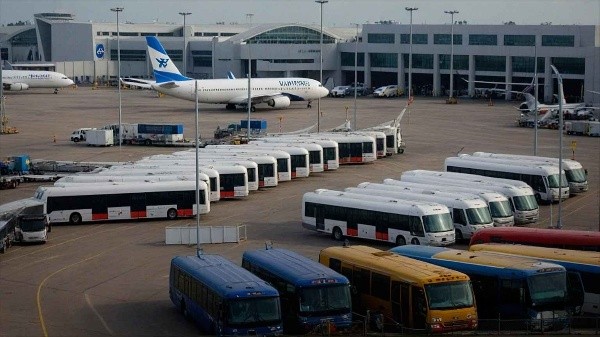Iran’s Plan to Strike Back Against the U.S.
Iran’s Military Preparations Following U.S. Attacks
Loading...

Recent figures have shown that passenger traffic at the main international airport in the Israeli-occupied territories plunged by 43% during the first nine months of the current year due to the ongoing onslaught on the Gaza Strip and escalating confrontations with Lebanese Hezbollah resistance fighters.
Ongoing Conflict Impacts Air Travel
Recent data reveals that passenger traffic at Ben Gurion International Airport, Israel's primary international gateway, has plummeted by 43% during the first nine months of 2024. This dramatic decrease is largely attributed to the ongoing military operations in Gaza and escalating tensions with Hezbollah forces in Lebanon. The Israel Airports Authority reported that the airport served 10.85 million international passengers from January to September, a steep decline from the 19.01 million passengers recorded during the same timeframe in 2023.
Shift in Airline Operations
In response to the conflict, many international airlines have either suspended or reduced their flights to the region. This shift has led to an increase in passengers opting for Israeli carriers, which have reported a rise in traffic of up to 25%. The situation remains fluid, with airlines frequently altering their flight schedules, often suspending and then quickly resuming services based on security assessments.
The European Commission, alongside the European Union Aviation Safety Agency (EASA), issued a statement late last month recommending that commercial jets avoid Lebanese airspace and the skies above the occupied Palestinian territories. This advisory has prompted several airlines to halt flights to both areas. Major European carriers, including the Lufthansa Group, KLM, and Virgin Atlantic—who had recently resumed services to Tel Aviv—have since suspended operations again.
Longer Flight Routes and Operational Challenges
As a result of the current security situation, airlines operating in the region are now compelled to take longer flight paths. Many have begun utilizing Egyptian and Saudi Arabian airspace to circumvent potential conflict zones, significantly altering traditional flight routes. This change not only impacts operational efficiency but also adds to the travel time for passengers, exacerbating the challenges faced by carriers and travelers alike.
Dramatic Drop in Foreign Tourism
Further highlighting the impact of the conflict on travel, a report from Israel's Central Bureau of Statistics indicated a staggering 73.2% decrease in the number of foreign tourists visiting the Israeli-occupied territories. The figures dropped from 2.83 million visitors during the first nine months of 2023 to just 757,100 in the same period this year. This decline underscores the broader implications of the ongoing conflict, as tourism plays a vital role in the region's economy.
Future Outlook
The substantial drop in passenger traffic and tourism signals a challenging period ahead for Israel's aviation and tourism sectors. As the conflict remains unresolved, the potential for further declines in travel is significant. Airlines will need to navigate a landscape of fluctuating security advisories, changing travel patterns, and shifting consumer preferences to adapt to the evolving situation. While Israeli carriers may experience a temporary boost in traffic, the long-term effects of the ongoing conflict on the region's connectivity and attractiveness to international travelers remain uncertain.
In conclusion, the ongoing military actions and regional tensions are reshaping the air travel landscape in Israel, with significant repercussions for airlines and tourism. As the situation unfolds, stakeholders will be closely watching how these dynamics evolve in the coming months.
Editor
Iran’s Military Preparations Following U.S. Attacks
Troops remain in five strategic locations, raising fears of renewed tensions and long-term occupation.
Opposition forces have taken control of the capital after a significant offensive. Here is how it unravelled.
